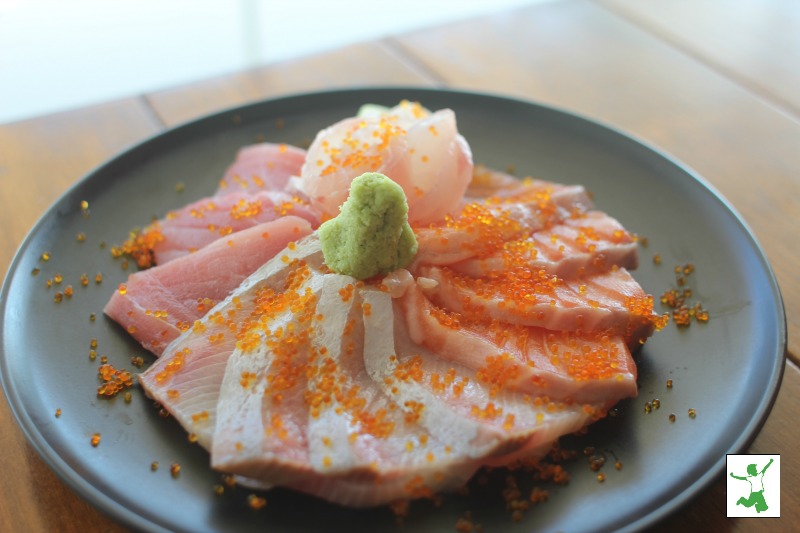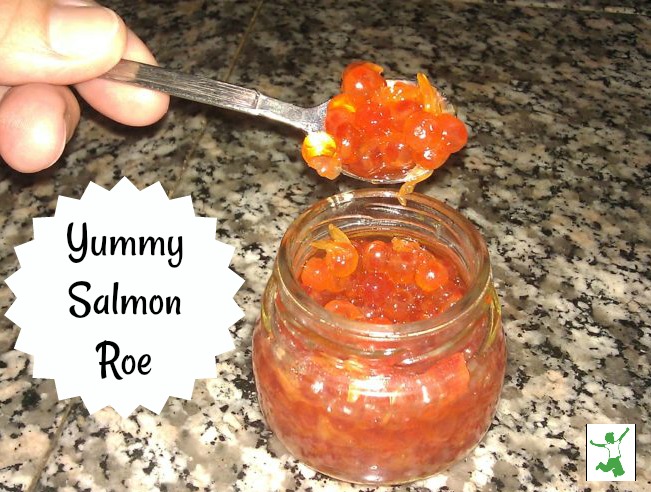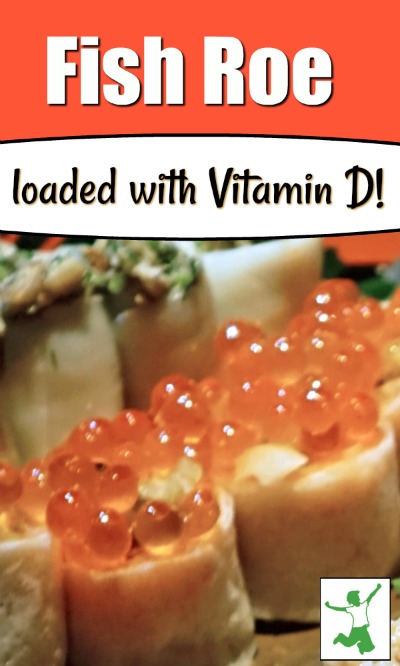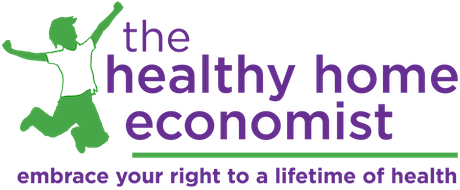Fish eggs are extremely high in vitamin D and a much safer and better choice than drops or pills for resolving this common nutritional deficiency. What to look for to source the highest quality roe with no additives.

Are fish eggs, also referred to as fish roe, a better choice than Vitamin D drops for resolving worrisome signs of vitamin D deficiency?
Vitamin D is surely the darling of supplements at the moment. More and more exciting news keeps coming out about this Wonder Vitamin and its beneficial effects in reducing the chances of many kinds of cancer, heart disease, and autoimmune disorders. The research is simply too groundbreaking to ignore.
I wrote a couple of posts last year about how the seasonal flu is really just Vitamin D deficiency disease and why I take a cod liver oil supplement every day even when I get good doses of midday Florida sunshine. I find the role of Vitamin D in the body and its ability to preserve health and reduce inflammation of all kinds very exciting.
Nearly 80% of People Deficient in Vitamin D
According to a study published by the peer-reviewed Archives of Internal Medicine, nearly 80% of Americans were deficient in this critical nutrient in 2009. Is it worse today? I would wager that it probably is given the advent of smartphones and less time spent outdoors! (1)
These numbers have even conventional doctors jumping on the bandwagon with more frequent testing. Supplementation is the solution commonly recommended when Vitamin D levels are too low to reap any health benefits.
While I think the enthusiasm over Vitamin D is wonderful, I personally do not feel comfortable with the casual way that high dose Vitamin D supplements are being recommended.
In some ways, it seems like Vitamin D has become just another drug!
Taking a single vitamin or nutrient in isolation is a practice that should be used with caution. This is especially true with Vitamin D, which is fat-soluble. Toxic blood levels from supplementation can and do occur.
For this reason, a food-based supplement that supplies Vitamin D is safer. In addition, a whole food source like high vitamin cod liver oil supplies not only Vitamin D, but also Vitamin A and other nutritional cofactors which work synergistically to prevent toxicity.
Watch out, though. Many cod liver oil brands are high-heat treated, which destroys the natural Vitamin D. Synthetic Vitamin D is added back after processing, but this fact is not indicated on the label.
Be sure to use only brands that do not heat the oil. This is the vetted and tested brand I use.
Vitamin D Foods and UVB Sunshine
What if your Vitamin D blood levels are so low that you can’t take enough cod liver oil each day to bring them up very quickly?
What if you live in a climate where getting a decent dose of midday UVB sunshine to produce Vitamin D via the skin is not an option for a substantial portion of the year?
Clearly, taking more than a teaspoon or two of cod liver oil each day to try and boost Vitamin D levels is not the answer in these situations.
Too much cod liver oil each day results in consuming too many omega 3 fatty acids. This can be just as bad as too little. Both scenarios can result in inflammatory conditions in the body.
In those instances, then, larger doses of Vitamin D are obviously required in addition to the daily dose of high vitamin cod liver oil.
However, there is a better and safer way to increase your Vitamin D blood levels quickly without those potentially dangerous high dose Vitamin D drops and pills!
Fish Eggs: Traditional Sacred Food to the Rescue
Fish eggs, also known as fish roe, were highly prized by the natives of South America who would sometimes travel hundreds of miles from their mountain villages down to the sea to procure it in dried form. This superfood was then provided to women of childbearing age to ensure healthy and robust babies and children.
The Eskimos also consumed fish roe from a number of fish species, particularly salmon. Fish eggs were dried for consumption during winter months and for special feeding to pregnant women.
How Much Vitamin D in Fish Roe?
It is no wonder fish roe was so highly prized by isolated natives.
According to an analysis carried out by the Weston A. Price Foundation, a single tablespoon of fish roe contains approximately 17,000 international units of vitamin D. (2)
In addition, fish roe contains vitamins A, K2, zinc, iodine, and the brain supporting omega 3 fatty acid DHA in ample amounts.
One tablespoon of fish eggs, then, supplies a similar amount of Vitamin D as a midday dose of Vitamin D on the skin!
Incidentally, one tablespoon of pastured lard clocks in at 10,000 IU of Vitamin D according to tests by the Weston A. Price Foundation. This healthy fat is a great alternative for those who are allergic to fish.
Synergistic Nutrients
Vitamin A and particularly Vitamin K2 work synergistically with Vitamin D to prevent toxicity and over calcification of the soft tissues, bones, heart, and/or kidneys, hallmark symptoms of Vitamin D overdose. The K2 can be the animal form (MK-4) or the fermented form (MK-7).
Given this information, doesn’t it seem much wiser to use fish eggs as that big Vitamin D boost rather than potentially dangerous and untested Vitamin D drops and pills?
The truth is that no one really knows what the long term effects of taking large doses of Vitamin D in isolation will be. Do you really want to be a guinea pig or do you want to use the safe and effective Vitamin D boost that the Eskimos and traditional mountain-dwelling tribes of South America used when sunlight was not a readily available option?
Where to Get Fish Eggs
I buy small glass jars of salmon roe at gourmet grocery stores for as little as ten to fifteen dollars.
The brand of fish roe I buy has only 3 ingredients: fish roe, salt, and water. Make sure the brand of fish eggs you choose does not contain any preservatives or colors added.
If you can find a fresh or dried source of caviar, so much the better!

How to Eat Roe
I love my salmon roe right off the spoon.
I eat 1/4 – 1/2 tsp in the morning with breakfast a few times a week. They are so salty and delightful. If you aren’t sure you like it at first, try it a few more times as roe can sometimes be a bit of an acquired taste.
If you simply can’t get used to fish eggs off the spoon, try some topped on whole-grain crackers with some creme fraiche.
Another option is to eat sushi! Many recipes for sushi rolls are topped with generous amounts of fish eggs.
Note that fish roe make great finger food for toddlers!
In my mind, fish eggs are a much superior – and delicious method for quickly raising and maintaining optimal Vitamin D levels.
What is your favorite way to eat fish roe? Do you like it off the spoon as I do?







Thank you for sharing the informative article.
What is your source for stating that too much Omega 3 intake results in inflammation? According to other sources I’ve read (such as Dr. Weil) that is simply not the case. Thank you.
Omega-3 fats are polyunsaturated fats just the same as omega-6. Small amounts of omega-3 are highly beneficial and anti-inflammatory, but if you get too much, it triggers inflammation just like too much omega-6. https://www.westonaprice.org/health-topics/know-your-fats/precious-yet-perilous/
I never knew that fish roe is so much better option for Vitamin D. I easily get it locally but never use because of a dense smell. But now onwards will be using in my food as a super medicine. Thanks for floatingng such a precious info on this.
I doubled my vitamin D levels from 15-30 in 6 weeks by eating a teaspoon of fish roe per day! My doctor “couldn’t argue with the results”. I mix it in with my scrambled eggs and cheese in the morning. It’s not even noticable. My 3 year old loves it right off the spoon!!!! It’s my bribe to get her to finish her breakfast. Who would have thought!
Do fish eggs carry parasites?
This post was so helpful as I have been advised to take Vitamin D during my pregnancy, but just wasn’t convinced of taking it in doses by itself. I know you mentioned that you wouldn’t want to keep increasing cod liver oil as to many Omega 3 fatty acids also wouldn’t be good. However, if I start taking fish eggs during my pregnancy to increase my Vitamin D levels, wouldn’t there also be Omega 3 fatty acids in the fish eggs. Thanks for helping me understand this!
The ‘more information’ link doesn’t work. Could you please provide a link to the source for this information? Thanks.
Did the author ever give her source for the Vitamin D Content of Fish roe? I can find no sources that give these high numbers, or really any numbers at all, except the WAP foundation, and they have no sources for their numbers either. The only thing that I could find was the nutrition facts for a fish roe product that gives the vitamin d content as zero!
So, could you please cite your source for your Vitamin D numbers? I fear you are misleading people with numbers pulled from thin air since several people have asked for your source and you have yet to provide it.
Yes, it was sourced at the end and was based on testing by the Weston A. Price Foundation.
Where is the source? I don’t see it in your blog post. There is just a link to another one of your blog posts. Does the WAPF have copies of the independent lab reports that they could post?
Not sure if this went through the first time as the comment disappeared, but you say that the source for your claim of 17,000 per tablespoon is at the bottom of the post, but it’s not. Three other posters have asked you for the source, and you still keep answering the questions of others, but are not answering the question of your source for 17,000.
In fact, one poster took you at your word and she said that using fish roe for her vitamin D has a ‘catastrophic’ effect on her Vitamin D levels.
So, are you going to post a source or change your info? Or will you continue to allow others to follow possibly incorrect advice and possibly harm their health?
I’m posting 2 sources that contradict these numbers.
This site says there is no Vitamin D.
nutritiondata.self.com/facts/finfish-and-shellfish-products/4098/2
Here’s a peer reviewed study citing about 100 per tablespoon:
advances.nutrition.org/content/4/4/453.full
Another poster below posted a source that contradicts the 17,000 per tablespoon and has it at 68 IU’s per tablespoon. It’s here:
ndb.nal.usda.gov/ndb/foods/show/4554?fgcd=&manu=&lfacet=&format=&count=&max=35&offset=&sort=&qlookup=roe
So can you please provide the source since you’ve been asked multiple times, so that others are not harmed by this incorrect info? That’s what responsible journalism is about.
Thank you.
I posted the source within the article. The figure is according to a recent WAPF-funded analysis by UBE Laboratories, fish eggs contain 17,000 IU vitamin D per tablespoon! – See more at: http://www.westonaprice.org/health-topics/sacred-foods-for-exceptionally-healthy-babies-and-parents-too/#sthash.ck2raepv.dpuf
I love fish eggs. I grew up eating that stuff.